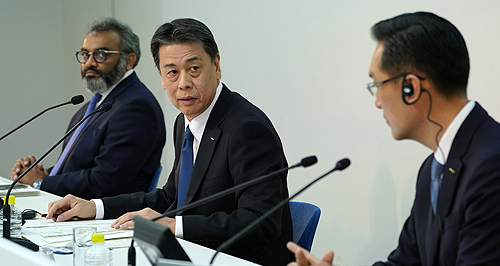Make / Model Search
News - NissanNissan unveils four-year financial planStreamlined processes, reduced production headline Nissan’s four-year growth plan31 May 2020 NISSAN Motor Company has laid bare its plans to stimulate growth and profitability over the next four years to the end of financial year 2023, while curbing what the brand refers to as “excessive sales expansion”.
The strategy is built around two primary facets, the first being the rationalisation of its business with reduced costs and improved efficiency, with the second area placing an emphasis on core markets and products.
Along with implementing structural reforms, Nissan will streamline unprofitable operations and surplus facilities, with an intended goal of a five per cent operating profit margin and six per cent global market share.
Arguably the largest factor in the brand’s rationalisation plan will be reducing global production capacity by a considerable 20 per cent to 5.4 million units per year while also shrinking its global product line-up by 20 per cent, from 69 models to fewer than 55.
Nissan will aim to increase profitability by increasing its plant utilisation rate to above 80 per cent, and will close manufacturing facilities in Barcelona and Indonesia.
The Barcelona plant produces European versions of the Navara pick-up which will be moved to South Africa, as well as the e-NV200 van which is rumoured to move to France.
Nissan’s announcement has prompted protests outside the Barcelona factory, with hundreds of workers blocking entry to the plant.
The Indonesian plant produces the not-for-Australia Livina MPV, with production being moved to Thailand which will serve as the single production base for ASEAN markets.
Fixed costs for the company will be reduced by approximately 300 billion yen ($A4.21b), while Alliance partners – namely Renault and Mitsubishi – will be used for resource-sharing on models, production and technologies.
As reported by GoAuto, the depth of model sharing is yet to be fully disclosed by the Alliance, with each of the three car-makers to develop a “leader-follower” strategy that hands product development responsibilities to one brand, which will help reduce model investment costs by 40 per cent.
However rumours that models from the three brands will essentially be reskinned versions of the same car have been played down by the brands, saying that the individuality of each marque will remain intact.
Along with the rationalisation measures, Nissan will focus its core operations on the Japanese, Chinese and North American markets, while using the Alliance’s assets to remain relevant in South America, ASEAN and Europe.
Some ASEAN markets will see their operations streamlined, while Nissan will exit the South Korean market and drop the Datsun brand in Russia.
Core model segments such as EVs, C- and D-segment vehicles and sportscars will be prioritised, with the brand to launch 12 new models in the next 18 months.
EVs in particular will be emphasised, with an annual goal of one million electrified vehicle sales by the end of 2023.
In Japan, two new full EVs and four additional e-Power hybrids will be introduced, with 60 per cent of vehicle sales in its home market to come from electrified models.
The streamlining strategy comes after a period of cost-cutting for Nissan, which announced in July last year it would slash 12,500 jobs from its global workforce, while a report surfaced earlier in the week that up to 20,000 jobs could be under threat.
Nissan released its fiscal-year 2019 results yesterday which showed why it is looking to streamline its operations, with factors including the COVID-19 pandemic resulting in a 14.6 per cent drop in revenues, a 91.9 per cent plunge in operating profit and a -3.1 per cent operating margin percentage.
The brand anticipated a decline of 15 to 20 per cent in global total industry volume, which is likely to reduce profits further.
Speaking on the financial plan, Nissan CEO Makoto Uchida said the strategy was based around steady growth.
“Our transformation plan aims to ensure steady growth instead of excessive sales expansion,” he said.
“We will now concentrate on our core competencies and enhancing the quality of our business, while maintaining financial discipline and focusing on net revenue per unit to achieve profitability.
“This coincides with the restoration of a culture defined by “Nissan-ness” for a new era.”  Read more |
Click to shareNissan articlesResearch Nissan Motor industry news |












Facebook Twitter Instagram